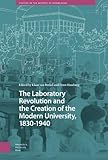The Laboratory Revolution and the Creation of the Modern University, 1830-1940 / ed. by Klaas Berkel, Ernst Homburg.
Material type: TextSeries: Studies in the History of Knowledge ; 5Publisher: Amsterdam : Amsterdam University Press, [2023]Copyright date: ©2023Description: 1 online resource (346 p.)Content type:
TextSeries: Studies in the History of Knowledge ; 5Publisher: Amsterdam : Amsterdam University Press, [2023]Copyright date: ©2023Description: 1 online resource (346 p.)Content type: - 9789048551040
- Education, Higher -- History -- 19th century -- Europe
- Education, Higher -- History -- 20th century -- Europe
- Laboratories -- History -- 19th century -- Europe
- Laboratories -- History -- 20th century -- Europe
- Science -- History -- 19th century -- Europe
- Science -- History -- 20th century -- Europe
- History, Art History, and Archaeology
- Modern History
- Science and Technology
- Sociology and Social History
- HISTORY / Europe / Western
- Laboratory, University, Division of Labour, Scientific Research Architecture
- 507.1/14 23/eng/20230511
- Q183.E85
- online - DeGruyter
| Item type | Current library | Call number | URL | Status | Notes | Barcode | |
|---|---|---|---|---|---|---|---|
 eBook
eBook
|
Biblioteca "Angelicum" Pont. Univ. S.Tommaso d'Aquino Nuvola online | online - DeGruyter (Browse shelf(Opens below)) | Online access | Not for loan (Accesso limitato) | Accesso per gli utenti autorizzati / Access for authorized users | (dgr)9789048551040 |
Frontmatter -- Table of Contents -- List of Figures and Charts -- Preface -- Part I The Laboratory Revolution: Origins and Impact -- 1 The Joint Emergence of the Teaching-Research Laboratory and the Modern University: An Introduction -- 2 Origins and Spread of the ‘Giessen Model’ in University Science -- 3 The Laboratory Ethos, 1850–1900 -- Part II Laboratory Networks -- 4 Chemistry in Zürich, 1833–1930 : Developing the Teaching- Research Laboratory in the Swiss Context -- 5 Island Kingdoms in the Making : The New Laboratories and the Fragmentation of Dutch Universities c.1900 -- 6 A Fertile Ecosystem : University Chemical Laboratories and their Suppliers in Fin-de-Siècle Paris -- 7 Fighting for Modern Teaching and Research Laboratories in Norway : The Chemistry Laboratory in Political Dispute around 1920 -- 8 Religion and the Laboratory Revolution : Towards a Physiological Laboratory at a Calvinist University in the Netherlands, 1880–1924 -- Part III Laboratory Values -- 9 Aspects of the Social Organization of the Chemical Laboratory in Heidelberg and Imperial College, London -- 10 Of Growing Significance : The Support Staff in the Laboratories and Institutes of Utrecht University during the Interwar Period -- 11 A Revolution in Genetics at Gendered Experimental Venues : Cambridge and Berlin, 1890–1930 -- 12 Serialized Laboratories : Laboratory Journals and the Making of Modern Science and Scientific Publishing, 1840s–1950s -- 13 Images of the Laboratory in the Popular Press -- Acknowledgements -- Index
restricted access online access with authorization star
http://purl.org/coar/access_right/c_16ec
The modern research university originated in Europe in the second half of the nineteenth century, largely due to the creation and expansion of the teaching and research laboratory. The universities and the sciences underwent a laboratory revolution that fundamentally changed the nature of both. This revolutionary development began in chemistry, where Justus Liebig is credited with systematically employing his students in his ongoing research during the 1830s. Later, this development spread to other fields, including the social sciences and the humanities. The consequences for the universities were colossal. The expansion of the laboratories demanded extensive new building programs, reshaping the outlook of the university. The social structure of the university also diversified because of this laboratory expansion, while what it meant to be a scientist changed dramatically. This volume explores the spatial, social, and cultural dimensions of the rise of the modern research laboratory within universities and their consequent reshaping.
Mode of access: Internet via World Wide Web.
In English.
Description based on online resource; title from PDF title page (publisher's Web site, viewed 06. Mrz 2024)


